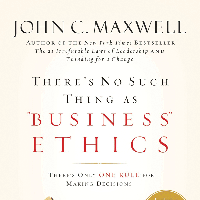 John Maxwell’s provocative title “There is no such thing as Business Ethics” tends to result in nods of agreement, shrugs of – what else is new – or dismay by those who think that the ethics course they took was a fraud. Ethics is both complicated and simple, and Maxwell makes it simple and to the point. He writes, “There is Only ONE RULE for making decisions” – the Golden Rule.
John Maxwell’s provocative title “There is no such thing as Business Ethics” tends to result in nods of agreement, shrugs of – what else is new – or dismay by those who think that the ethics course they took was a fraud. Ethics is both complicated and simple, and Maxwell makes it simple and to the point. He writes, “There is Only ONE RULE for making decisions” – the Golden Rule.
We are reminded that America’s recent preoccupation with business ethics goes back to the hippy movement in the 1960s when ethics and love were united by justifying all behaviors if they were connected to LOVE. Then, with the publication of Joseph Fletcher’s book titled “Situational Ethics,” a trend to rationalize what was ethical or unethical became mainstream and left the sanctity of the branch of philosophy called ethics to become embedded in MBA programs. Business ethics courses emerged as part of academic study and were often paired with legal studies as a shortcut to create society’s standards. Much to the chagrin of philosophers, what was legal was then also touted as also being ethical.
The Federal Sentencing Guidelines for Organizations (FSGO) became effective in 1991 giving organizations with ethics officers and ethics programs reduced federal fines if they were found to practice unethical or illegal conduct. This generated another flurry of ethics seminars and training programs in organizations. These activities became a hedge for organizations to ensure that fines were minimized should they be cited for wrongdoing by the federal authorities.
Maxwell gives a short list of companies including Enron, Arthur Anderson and WorldCom who failed and were scandalized by their unethical behavior in spite of their grandiose ethics policies that had been carefully crafted by top management. It should be noted that Maxwell’s book was printed in 2003 – before the hedge fund cowboys who produced the derivative frenzy gave us the financial disaster of 2008.
According to Maxwell, what has been promoted as “business ethics” has produced charlatans in some organizations and a false sense of security among many who, in the end, lost their jobs, their pensions or their life savings.
To keep it simple and get back to basics, Maxwell reminds us that ethics and moral behavior are standards embedded across cultures in what we call the Golden Rule: “Whatever you want men to do to you, do also to them.” He has a large list of similar versions of the Golden Rule from all major religious or philosophical traditions. They are basically the same – do onto others as you would have them do onto you.
The book is a small work book with short reflective exercises at the end of most chapters. It is sprinkled with quotations and examples of successful people who followed the Golden Rule including the founder of J.C Penny and a former Navy captain who wrote “It’s Your Ship.” It falls short by making it too simple. The book would benefit by discussing moral development and probing into influences that erode moral standards and the Golden Rule.
Yet, it is a good start in that it questions assumptions about ethics and brings ethics back into a societal standard and links it to a global standard by reminding the reader of the numerous similar versions (globally) of the Golden Rule.
Lucia Worthington has an undergraduate degree in philosophy and a graduate degree in business and management. Rather than teach business ethics, she teaches business and management within the context of moral development and ethical decision making. She can be reached at: success@lworthington.com. To recommend a book for review, email bookreviews@vbjusa.com.


